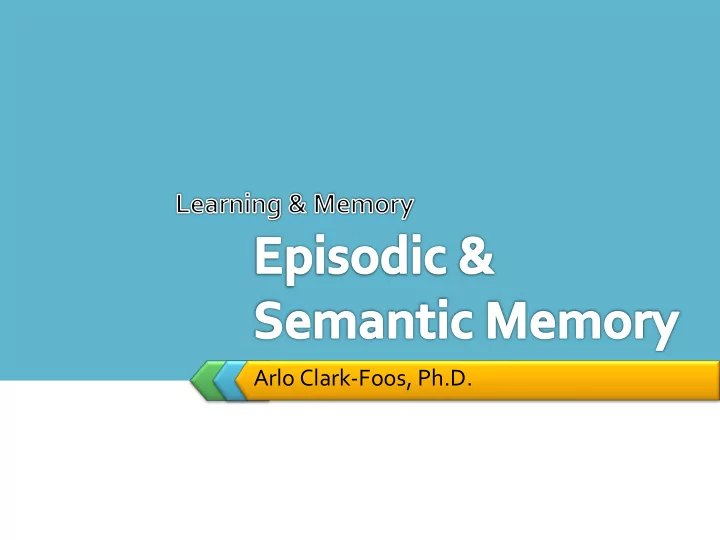

Arlo Clark-Foos, Ph.D.
Medial Temporal Lobes Henry Molaison (HM) (1926-2008) Consequences of bilateral removal
Episodic and Semantic Memory Endel Tulving on Declarative (Explicit) Memories Episodic Memory “ Conscious recollection of specific past events ”; Spatial and temporal context Contrasted with Semantic Memory Accumulated knowledge that is not tied to any particular event, time, or place, but is also subject to conscious recollection Flexibility “Remembering” vs. “Knowing” Rate of Acquisition Latin for Arch
Autobiographical Memory Is it episodic memory? Diary Studies (e.g., Linton, 1975): 5,500 events Memory for unique and emotional events Preferential recording? Brewer’s (1988) Pager study Childhood amnesia Reminiscence bump
Chickens and Eggs Tulving Episodic depends on semantic Bransford & Johnson (1972) Conway/Rajaram Episodic to semantic shift Verfaellie/Neath Interdependent
Speaking of Chickens “Episodic - like” memory in nonhumans? What-where-when (Crystal, 2010) Is this episodic or semantic?
Encoding Mere exposure BBC Radio announcement (Bekerian & Baddeley, 1980) Memory for everyday events Connections to existing memories Bransford & Johnson (1972) again. LOP Recall
Encoding Levels of Processing (AKA Depth of Processing) Nairne, Thompson, Craik & Tulving (1975) Rogers, Kuiper, & Kirker (1977) & Pandeirada (2007)
Problems with LOP Vague Testing Bias & Transfer Appropriate Processing Morris, Bransford, & Franks (1977)
Context Dependent Memory Encoding Specificity Godden & Baddeley (1975) Transfer Appropriate Processing Marsh’s bet Studying for Exams Advice from How High and Eich et al. (1975)
Testing Memory Free Recall What is the Latin word for arch? Cued Recall What is the Latin word for arch? F________ Recognition What is the Latin word for arch? A. fenestra B. fornix C. fundus
Testing Effects Why? Mere exposure sucks TAP Desirable difficulties (Soderstrom & Bjork, 2015)
Memory Failures Passive vs. Directed Forgetting
Memory Failures Interference
Memory Failures Reality/Source Monitoring DRM Paradigm (Deese, 1959; Roediger & McDermott, 1995) Theme Words Schizophrenia Cryptomnesia
Memory Failures DRM again Loftus & Pickrell (1995) Wade et al. (2002) Slate (online magazine) Innocence Project
Making Lasting Memory Consolidation and reconsolidation W. Estes’s perturbation model Electroconvulsive shock and ECT Vulnerability of new and recently accessed memories transcranial Direct Current Stimulation (tDCS) Temporarily increases excitability, increases recall
Know Thyself Metamemory Tip-of-the-tongue Feelings of Knowing Judgments of Learning STUDY TEST 1 TEST 2 PAIRED- 40 WORD PAIRS ASSOCIATES GENDER TEST TEST 20 ♂ 20 ♀ IV: Instructions to learn Gender RTs to DK response
THE BRAIN
Semantic Memory Sensory vs. Association Cortices Specificity of Encoding Peanut vs. Banana (Thorpe, Rolls, & Maddison, 1983) Steve Carell, Whoopie Goldberg, and Bill Clinton Quiroga et al. (2005)
Semantic Memory Extrastriate Body Area (EBA) Right lateral occitpital cortex (Downing et al., 2001)
Medial Temporal Lobes H.M. (surgery) & E.P. (viral encephalitis) Anterograde vs. Retrograde Amnesia
Necessity of Hippocampus …to Semantic memory? Moderate vs. Severe damage to MTL Including damage to parahippocampal and perirhinal Categorization using a prototype (Reed et al., 1999) Parahippocampal area may provide spatial context Parahippocampal place area
Observing Hippocampi in Action Subsequent Memory Paradigm (Wagner et al., 1998) Greater activity in left hippocampus and left PFC for incidentally encoded words that were later recalled. LOP Effects False Memories
Hippos and Cortices Consolidation and the Ribot gradient (1882) Standard Consolidation Theory vs. Multiple Trace Theory Predictions: Equal vs. Less Hippo activity for distant memories.
Frontal Cortex Remember the subsequent memory effects Deciding what to remember Directing encoding vs. Directing forgetting Confabulation in frontal patients
Other Important Structures Basal Forebrain Nucleus Basalis & Medial Septal Nuclei Anterior communicating artery aneurysm (ACoA) results in anterograde amnesia Neuromodulators: GABA & acetylcholine Affect hippocampus via fornix Damage to fornix Confabulation and source monitoring Diencephalon Mamillary Bodies & Mediodorsal Nucleus of Thalamus Korsakoff’s disease & thiamine Temporally graded retrograde amnesia May affect interaction of frontal cortex and hippocampus
Other Amnesias Transient Global Amnesia (TGA) Concussions Sex and other physically strenuous activities Typically brief (loss of blood flow to hippocampus)
Other Amnesias Functional Amnesia As opposed to Organic Amnesia Dissociative amnesia and dissociative fugue. EXTREMELY RARE Schacter & P.N.’s amnesia following death of grandfather Identity loss but semantic memories intact. Faking? PET Scan Abnormal activity in MTL and Diencephalon fMRI Akin to directed forgetting in PFC
Recommend
More recommend